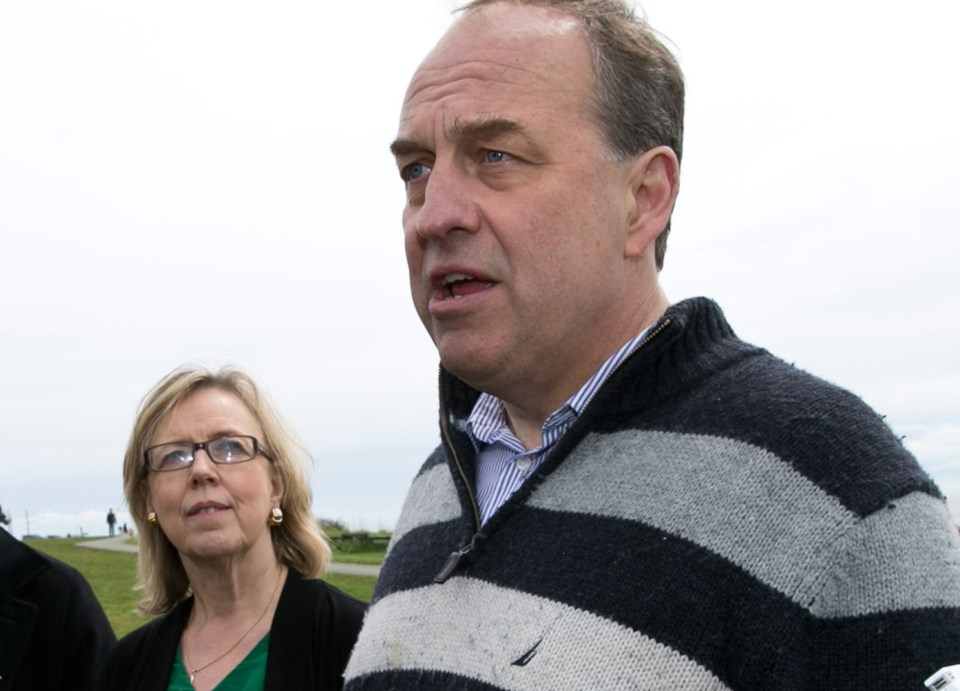 Over the past year or more of sustained concern about B.C. Liberal fundraising, the party has a track record of standing pat and facing down the criticism, then relenting a bit.
Over the past year or more of sustained concern about B.C. Liberal fundraising, the party has a track record of standing pat and facing down the criticism, then relenting a bit.
After a burst of concern last year, Premier Christy Clark adjusted the party’s stance slightly and promised “real-time” disclosure of all donations. It means instead of waiting for Elections B.C. to release all parties’ donor lists once a year, the Liberals post names and amounts every week or so.
After another controversy about the fact the party was using some of that money to top up her salary by $50,000 a year, she abruptly put a stop to the long-standing arrangement in January.
This week, the government is expected to make another move on the fundraising issue — introducing legislation to require all parties to meet the new disclosure standard they adopted at the start of the year. People are wondering if the continued agitation over the issue will prompt them once again to go a bit further, perhaps by putting a mild limit on the lucrative reception racket, also known as pay to play. People are dinged for thousands of dollars a ticket to attend party fundraisers where the premier and cabinet ministers show up to mingle.
Ontario Liberals faced similar controversy over the practice last year, and Premier Kathleen Wynne banned private events effective at the start of this year. Parties can still raise money at public events, but not at soirées on private grounds.
Adding that provision to real-time disclosure would be a baby step away from the current “wild west,” anything-goes system that B.C. Liberals preside over.
That system took another hit last weekend with a Globe and Mail revelation that the lobbyists who play a central role in stocking those receptions with guests have been getting lax about the bookkeeping. It’s illegal to pay for a ticket on behalf of someone else, since it amounts to a secret donation where the lobbyist is just the cutout person for an anonymous donor.
But the practice of lobbyists buying tickets on the record, then billing the clients later in private, is suspected of being widespread to the point of being fairly routine.
Elections B.C. launched a belated review of the practice Monday after the revelations, which were based partly on Elections B.C. data.
Green Party Leader Andrew Weaver welcomed the review, but is also asking the RCMP to investigate if there are grounds for a criminal investigation. Standard practice would be for Elections B.C. to make that determination.
The Elections B.C. action will encompass both Liberals and the NDP, but NDP Leader John Horgan said his party has far less to worry about when it comes to lobbyists.
“I’ve instructed staff to review the last three years of donations, to make sure we have not made the same glaring error the B.C. Liberals have done. But I have to tell you the volumes are significantly different. The number of lobbyists who want to speak to the official opposition is much lower than the number that want access to government.”
He dismissed the new disclosure requirements that are coming. He said the Liberals think that “what will make everyone happy is if we tell you every couple of weeks who’s giving us money.”
“That’s not the issue. It’s the influence that money is having on policy decisions that troubles British Columbians.”
Horgan tried to raise the issue in question period but Speaker Linda Reid ruled it out of order, as questions must relate to ministers’ areas of responsibility.
On a slightly different tack, he asked Attorney General Suzanne Anton if she would adopt the bill the NDP has introduced six times to ban big money from politics.
Anton said the Liberal government is committed to transparency and openness, as shown by the donation-disclosure change.
The Liberals are also committed to minimizing any risks going into the election campaign that starts next month. If they calculate that all the money they’re raking in is costing them political support, they’ll start moving a lot faster than they have to date.



